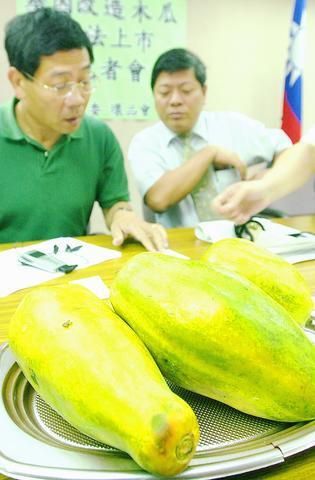Legislators and environmentalists criticized the Council of Agriculture yesterday for failing to regulate genetically modified (GM) papaya seedlings in lab fields after the Cabinet's Department of Health discovered two GM papayas growing in Taichung County.
Democratic Progressive Party (DPP) Legislator Eugene Jao (
According to Jao, the agriculture council commenced research in 1998 into the development of papayas resistant to the devastating papaya ring spot virus.

PHOTO: GEORGE TSORNG, TAIPEI TIMES
One of the laboratories working on this is in Wufeng Township, Taichung County. The health department inspectors also discovered GM papayas growing in Wufeng in 2001.
"Rather than benefiting from the scientific research, we have become victims," Jao said at a press conference yesterday.
Huang Shan-ney (
Eric Liou (
"The government should immediately launch a safety assessment regarding GM papayas," Liou said.
In Europe or North America, it takes at least 10 years to complete a GM food safety assessment to safeguard consumers' health, Liou said.
"If we don't know anything about GM papayas, the product should not be available on the market," Liou said.
Pointing to a strain of GM papayas in Hawaii as an example of how the problem should be handled, Liou said the product was strongly promoted when it went to market five years ago, but last year it was scientifically associated with an allergen.
Liou said papaya cultivation is one of Taiwan's most important agricultural industries.
He said that it was not right that Taiwanese papaya farmers should to be hurt by the government's carelessness in regulating food products.
According to the health department, only two imported GM products are available on the Taiwanese market -- soya beans and corn. Another 11 GM food products and materials are under evaluation.
Health officials said the compulsory labeling of GM crops and products processed from GM foodstuffs would be implemented next year.

Alain Robert, known as the "French Spider-Man," praised Alex Honnold as exceptionally well-prepared after the US climber completed a free solo ascent of Taipei 101 yesterday. Robert said Honnold's ascent of the 508m-tall skyscraper in just more than one-and-a-half hours without using safety ropes or equipment was a remarkable achievement. "This is my life," he said in an interview conducted in French, adding that he liked the feeling of being "on the edge of danger." The 63-year-old Frenchman climbed Taipei 101 using ropes in December 2004, taking about four hours to reach the top. On a one-to-10 scale of difficulty, Robert said Taipei 101

Nipah virus infection is to be officially listed as a category 5 notifiable infectious disease in Taiwan in March, while clinical treatment guidelines are being formulated, the Centers for Disease Control (CDC) said yesterday. With Nipah infections being reported in other countries and considering its relatively high fatality rate, the centers on Jan. 16 announced that it would be listed as a notifiable infectious disease to bolster the nation’s systematic early warning system and increase public awareness, the CDC said. Bangladesh reported four fatal cases last year in separate districts, with three linked to raw date palm sap consumption, CDC Epidemic Intelligence

US climber Alex Honnold left Taiwan this morning a day after completing a free-solo ascent of Taipei 101, a feat that drew cheers from onlookers and gained widespread international attention. Honnold yesterday scaled the 101-story skyscraper without a rope or safety harness. The climb — the highest urban free-solo ascent ever attempted — took just more than 90 minutes and was streamed live on Netflix. It was covered by major international news outlets including CNN, the New York Times, the Guardian and the Wall Street Journal. As Honnold prepared to leave Taiwan today, he attracted a crowd when he and his wife, Sanni,

Taiwanese and US defense groups are collaborating to introduce deployable, semi-autonomous manufacturing systems for drones and components in a boost to the nation’s supply chain resilience. Taiwan’s G-Tech Optroelectronics Corp subsidiary GTOC and the US’ Aerkomm Inc on Friday announced an agreement with fellow US-based Firestorm Lab to adopt the latter’s xCell, a technology featuring 3D printers fitted in 6.1m container units. The systems enable aerial platforms and parts to be produced in high volumes from dispersed nodes capable of rapid redeployment, to minimize the risk of enemy strikes and to meet field requirements, they said. Firestorm chief technology officer Ian Muceus said